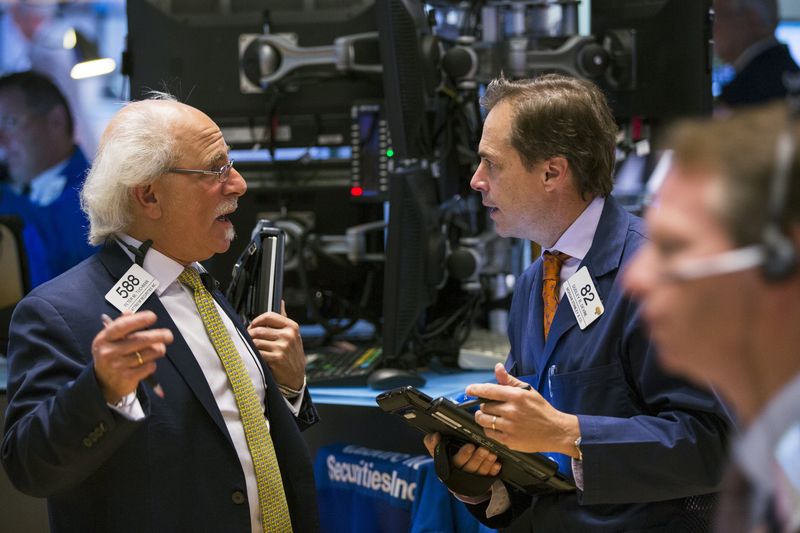Investing.com - Here are the top five things you need to know in financial markets on Monday, March 12:
1. Global Stocks Start The Week In Rally-Mode
Global stock markets got off to a strong start to the week, after the latest U.S. jobs report managed to impress with its strength while also easing fears of inflation and faster rate hikes, a neat feat that whetted risk appetites globally.
Asian shares ended broadly higher, with several indexes adding gains of 1% or more. Hong Kong's Hang Seng and Japan's Nikkei fared the best, closing up around 2% and 1.8% respectively.
In Europe, most of the continent's major bourses traded higher in mid-morning trade, with every sector trading in positive territory. The pan-European Stoxx 600 index, the region's broadest measure of share prices, edged up 0.4%, poised for its sixth straight day of gains.
Meanwhile, on Wall Street, U.S. stock futures pushed higher, an indication that equities may be ready to pick up where they left off late last week.
Dow futures were up 90 points, or 0.3%, from their Friday close, while S&P 500 futures gained 9 points, or 0.3%, and Nasdaq 100 futures tacked on 41 points, or roughly 0.6%.
There are no major earnings report on the docket for today, as fourth-quarter earnings season continues to wind down.
All three major U.S. stock indexes recorded gains of around 1.7% on Friday, with the tech-heavy Nasdaq hitting a fresh all-time high, following the 'Goldilocks' jobs report.
2. Dollar Loses Momentum, U.S. Bond Yields March Higher
The U.S. dollar slipped, losing some of its recent momentum, after the latest U.S. jobs report showed that job growth surged in February, recording its biggest increase in more than 1-1/2 years, but a slowdown in wage gains pointed to only a gradual increase in inflation.
That dampened expectations for four rate hikes by the Federal Reserve this year.
The dollar index, which gauges the U.S. currency against a basket of six major rivals, dipped 0.2% to 89.95. It hit its best level since March 1 at 90.36 on Friday.
Meanwhile, the U.S. 10-year Treasury yield ticked up to 2.91%, climbing back toward a four-year high of 2.957% reached last month.
Monday's calendar features no major economic data releases. Instead, investors will look ahead to this week's U.S. inflation and retail sales reports to gauge how it will impact the Fed's view on monetary policy in the months ahead.
3. Oil Slips Ahead Of EIA Monthly Update On Shale Output
Oil prices edged lower, after soaring around 3% in the last session, as market players looked ahead to the U.S. Energy Information Administration's (EIA) monthly update on shale-oil production levels due later in the day.
U.S. WTI crude futures shed 28 cents, or 0.6%, to $61.66 per barrel, while Brent futures dipped 46 cents, or 0.7%, to $65.03 per barrel.
U.S. energy companies last week cut oil rigs for the first time in almost two months, with drillers cutting back four rigs, to 796, Baker Hughes energy services firm said on Friday.
Despite the lower rig count, which is an early indicator of future output, U.S. oil production, driven by shale extraction, rose to an all-time high of 10.37 million barrels per day (bpd) last week, staying above Saudi Arabia's output levels and within reach of Russia, the world's biggest crude producer.
4. Bitcoin Jumps Back Toward $10K-Level After Last Week's Rout
Bitcoin prices rallied back towards the $10,000 mark, bouncing back after sliding 18% last week.
The world's biggest virtual currency by market cap was up around 14% to $9,794.50, marking a gain of around $1,100.
Other major cryptocurrencies were also higher, with Ethereum, the world’s second largest cryptocurrency by market cap, rising about 7% to $736.09.
The third largest cryptocurrency Ripple advanced roughly 5% to trade at $0.82334.
5. Next Trump Economic Advisor?
President Donald Trump is strongly considering Christopher Liddell, a former executive at Microsoft (NASDAQ:MSFT) and General Motors (NYSE:GM), to succeed his departing top economic adviser, Gary Cohn, who quit last week after Trump decided to impose tariffs on steel and aluminum imports.
Liddell is currently the White House's director of strategic initiatives and has worked closely with Jared Kushner, the president's son-in-law and senior adviser, on efforts to streamline and update government functions.
